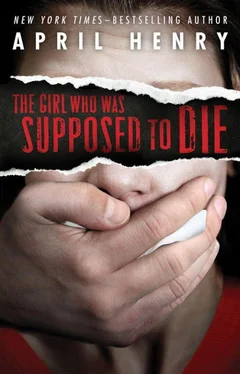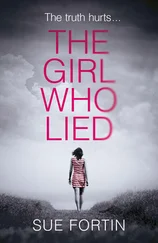“Okay.” I’m thankful when Ty starts walking without putting down his board.
A few minutes later, he pushes open the door of a coffee shop tucked in between a 7-Eleven and a dry cleaner. Brightly colored block prints of animals—a llama, an elephant, a cat—hang on the walls. A railed shelf holds dog-eared magazines. Only a single customer is seated at one of the small, round tables, a white-haired woman reading a newspaper.
The girl at the counter looks about twenty. Her long dark hair is pinned up in a messy bun held by a pencil. When she sees Ty, her face breaks into a smile.
“Hey, Audrey. Can we have two sixteen-ounce house coffees?”
“Sure.” She looks at me, and I have a feeling she doesn’t buy me being a boy. “Who’s your friend?”
He turns to me with a smile that doesn’t look forced. “This is Nate. He just moved here. And, Nate, this is Audrey.”
Not trusting my voice to be low enough, I nod. She gives me a brusque nod in return, then turns back to Ty. “Aren’t you supposed to be in class now?”
He shrugs. “It’s just health class. What am I missing? Self-esteem, condoms, no cigs, no drugs, no drinking. I think that about covers it.”
“Knowing you, I’m sure you’ve got all that covered already.” She winks, as if to underline that she and Ty are old friends. After pumping coffee into a thick white mug, she hands it to him. There’s a one-inch gap at the top. “I left room for cream.” She turns to me. “What about you? Do you need room?”
I find I actually know. “Definitely,” I say. Audrey narrows her eyes and only then do I realize I’m grinning like an idiot. I know something about me. It’s only a little detail—that I like coffee only when it’s got enough skim milk to be pale brown—but it’s the first time I’ve known something about myself without having to guess.
After we doctor our coffee—Ty also dumps three packets of sugar in his, which officially qualifies it as dessert—I take a seat at a table in the back corner so I can watch both the windows and the door. Ty sits to my left.
“I wish I could figure out what to do next.” I rest my cheek against the warmth of the mug.
“Well,” Ty says, “what do you want?”
“I want to know who I am.” I think of all the things I’ve heard in the last day. That I’m something to be gotten rid of. That I’m mentally ill. That I’m a killer. “I want to know what happened to me and why I don’t remember anything. I want to know what those guys thought I knew. And why they want to kill me. I want to find my family. I want to know what really happened to Officer Dillow. And then I want to figure out how to make everything get back to normal.” Thinking of Officer Dillow, I amend it with, “As much as possible.”
“Basically, you need information,” Ty says, and a lightbulb goes on.
“There must be a library somewhere around here, right? With computers people can use?”
“Yeah there is,” Ty says as he pulls out his cell phone and checks the time, “but it won’t open for more than an hour.” He sees the way I’m staring at his phone. “What?”
“The only way those men could have figured out where I went is because of Brenner’s phone. What if they can figure out where we are through your phone? Maybe you should turn it off. And take out the battery.”
His mouth twists. “What if James tries to call?”
“You could check your voicemail later from a pay phone.”
With a sigh, Ty turns his phone off and slides open the battery compartment.
Another customer has come in, a young woman with a baby in a stroller. Audrey walks around the counter to admire the sleeping infant.
“So how do you know Audrey?”
“I was homeless for a while last summer.”
I blink in surprise.
“Audrey was too. Still is.” He looks at her and then away, and runs his thumb across his lips. “It’s rougher for girls out there. I tried to keep an eye on her. When I moved in with James, I gave her my tent.”
Audrey is making the other woman’s coffee, laughing.
“She’s homeless?”
Ty flicks the underside of his thumbnail against his two front teeth. “How is she supposed to live on minimum wage when she only works twenty hours a week?”
“So she sleeps in a tent?”
“There’s a good spot near the bike path. I showed it to her. Most people don’t know about it. Sometimes she sleeps on the floor here, although her boss said he would fire her if he found her here again. We’d let her sleep at our place, but she says she doesn’t want to be a burden. She has a lot of pride.”
“But… homeless?” It still seems like such a huge thing.
“It’s not all bag ladies. There’s lots of kids who get thrown out, or who have to leave, or who think it will be an adventure. The adventure lasts about a day. There are kids who go to my school who live in cars. There are people who brush their teeth and comb their hair in public bathrooms before they go to work pumping gas.”
“So… how did it happen to you? What happened to your family?”
“It’s not important.” He looks away. His lips press into a firm line, then he turns back to me and they relax. “Let’s talk about your family instead. Didn’t you say you had a picture of them?”
I pull the backpack onto my lap and take out the framed photo. “I took this from the cabin. I think this is my family because that’s obviously me.” I tap my face. “But that’s all I know. And it’s not like you can tell anything by looking at it. Just four people in a snapshot.”
“Wait a minute.” Ty points at something in the background. “What’s that?”
DAY 2, 9:32 A.M.
Ty’s not pointing at anyone in the photo but rather at something behind us.
I haven’t really looked at the background until now. But the four people—the two adults who must be my parents, the little kid who I guess is my brother, and the girl I’m beginning to recognize as me—are all standing in front of a brick building. The sign reads MULTNOMAH ACADEMY OF—and then it’s cut off by the man’s shoulder. My dad’s shoulder.
“That must be where I go to school,” I say. And it feels as if another piece of the puzzle snicks into place, or nearly does, which I’m starting to think is about as good as it gets.
“Multnomah must mean Multnomah County,” Ty says. “Which means Portland.”
“So then what am I doing out here in Bend?”
Ty shrugs. “Didn’t you say that place where you woke up looked like a vacation cabin? Maybe your family was out here for a weekend and something went wrong.”
Then where’s my family? Why was the ransacked cabin empty except for me and the two men? I just nod, tracing my finger over the figures of the mom, the dad, the little boy. Will I ever touch my family in real life? If I had gone deeper into the woods instead of out of them, gone to the place where Michael Brenner was dragging me, would I have found them sprawled on pine needles, with bullet holes between their eyes? If I never remember them and they’re already dead—as I am beginning to fear they must be—will it be as if they were never alive?
Ty touches my hand. “I should go back and get my car. Then we could drive over to Portland and see if someone there knows what happened. Maybe your family’s even there.”
“You can’t go back, Ty. It’s not safe. If they tracked Brenner’s phone to the mall and then to your apartment complex, it won’t be long before they figure out that you’re the one who has both things in common.”
Ty opens his mouth to argue, then closes it when he sees my expression. Despite the men hunting me, despite my missing fingernails, I think this whole thing is still a game to him. Crowding into closets like kids playing hide-and-seek. He never heard Brenner’s breath hitching as he lay so still on the ground. He never saw Officer Dillow’s face when I pointed the gun at him.
Читать дальше












